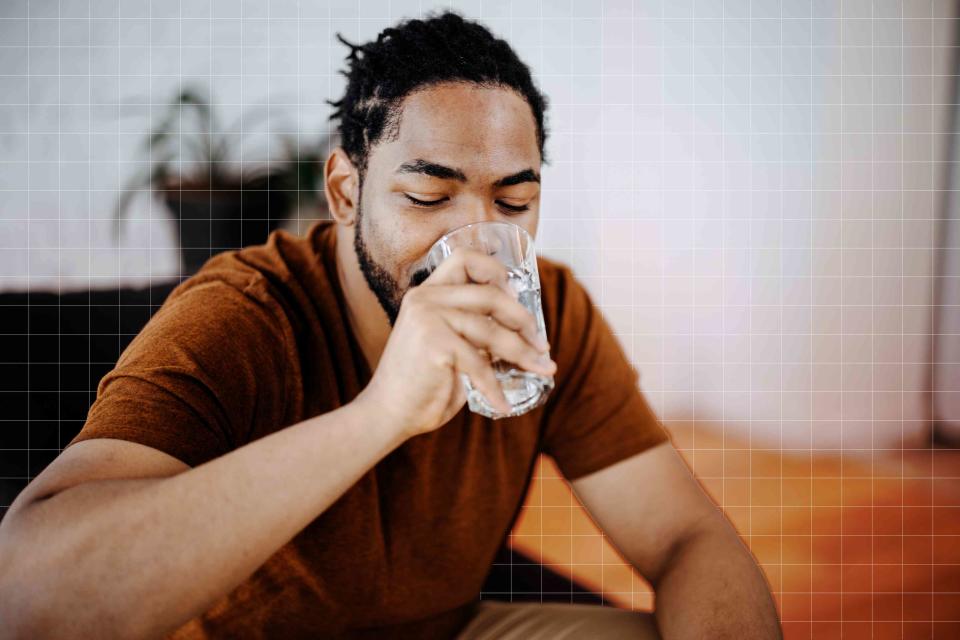5 Drinks to Avoid When You Need to Hydrate, According to a Dietitian
These sips may quench your thirst and are tasty—but they can dehydrate you, too.

Getty Images
Reviewed by Dietitian Emily Lachtrupp, M.S., RDReviewed by Dietitian Emily Lachtrupp, M.S., RD
It’s no secret that staying hydrated is essential for feeling your best. Plain H20 is the ideal choice, but other fluids—from sparkling water to prebiotic sodas, plus consuming water-rich foods—contribute to your hydration, too. However, not all drinks are created equal. Some beverages can cause your body to lose water, leading to dehydration.
So, what drinks should you avoid when you want to hydrate? Keep reading to learn about the worst drinks for hydration and the best (non-water) options to enjoy.
Related: The #1 Food to Eat When You're Dehydrated, According to Dietitians
5 Worst Drinks for Hydration
1. Sugary Drinks
Sugary drinks, such as sodas, energy drinks and sweetened teas, can lead to dehydration. “Beverages containing fructose and glucose, two types of sugar commonly found in sugary drinks, have been linked to worsening dehydration,” says registered dietitian Brittany Lubeck, M.S., RDN. These beverages often contain high amounts of sugar. When you drink a sugary beverage, your body needs to dilute the sugar by pulling water from your tissues, which can lead to dehydration over time, according to research. What’s more, says Lubeck, is that drinks like soda have been shown to increase oxidative stress on the kidneys—organs that play an important role in your hydration status. Sipping a sugary drink in moderation is OK, of course. Problems are more likely to arise when you’re consuming these drinks in large quantities or consistently throughout the day.
Related: What Happens to Your Body When You Drink Soda Every Day
2. Caffeinated Beverages
First, caffeine does have a diuretic effect, which means it causes you to urinate more. However, the good news is that the fluid you take in from your morning cup of coffee offsets this effect. In fact, having about two or three cups of coffee doesn’t seem to affect your body’s hydration. Issues come up when caffeine intake is excessive, which can become dehydrating. Lubeck recommends limiting excessive consumption and drinking plenty of water after consuming coffee, tea, energy drinks, soda or other caffeinated beverages. Additionally, look for decaffeinated versions of your favorite caffeinated drinks or herbal teas.
3. Alcohol
Alcohol is another diuretic that sends you on frequent trips to the bathroom. “Alcohol directly inhibits vasopressin, an antidiuretic hormone that aids in water retention,” Lubeck explains. “If you don’t drink water or other hydrating beverages along with alcohol, then you may find yourself dehydrated,” she says. There are so many ways you can enjoy a drink while maintaining your body’s fluid balance, such as having a glass of water between alcoholic drinks, or drinking lower-alcohol beverages, such as spritzers. And stick to the recommended limit of one drink per day for women and two drinks for men.
Related: I Quit Alcohol for 30 Days—and It Was Pretty Much Amazing
4. Energy Drinks
Energy drinks often contain high levels of caffeine and sugar—and as mentioned earlier, this is a double-dehydrating whammy for your body. Caffeine increases urination, while sugar can lead to an imbalance in fluid levels. Instead, opt for natural energy-boosting alternatives like green tea or matcha or coconut water. You can also make one on your own to control the ingredients and lower added sugar and calories, like this EatingWell Energy Drink featuring green tea and yerba maté.
5. Fruit Juice
While fruit juice can be hydrating, some varieties, such as fruit punch, lemonades, juice cocktails or fruit-flavored drinks, can contain a lot of added sugar. And just like the other beverages on this list, sipping them throughout the day can contribute to dehydration. Not to mention, sugary fruit juices are also linked to higher calorie intake. Alternatively, choose whole fruits over juice whenever possible to ensure you’re still getting fiber and other nutrients that help keep you hydrated. If you drink juice, look for 100% juice, ideally one that contains pulp so you get a bit of fiber, and enjoy in moderation.
Best Drinks for Hydration
When you need to quench your thirst, reach for these four sips:
Water: Water is the ultimate hydrating beverage. It’s essential for regulating body temperature, aiding digestion and transporting nutrients. Plus, pure water contains no calories, additives or sugars, making it the perfect choice for staying hydrated. And if you get tired of drinking water, you can always opt for carbonated water.
Milk: “Milk contains water, vitamins and minerals important to fluid and electrolyte balance,” says Lubeck. Cow’s milk offers an excellent balance of carbohydrates, protein and essential electrolytes like calcium and potassium. Additionally, research suggests milk can support post-exercise recovery by replenishing fluids and electrolytes lost through sweat.
Electrolyte drinks: Formulated to replenish fluids and essential minerals lost during intense exercise or in hot weather, electrolyte drinks typically contain a mix of sodium, potassium and magnesium, all crucial for maintaining proper hydration and muscle function. “Sports drinks and other electrolyte-containing beverages help with quick rehydration after a tough workout or day outside,” Lubeck says.
Coconut water: Also rich in electrolytes, particularly potassium, coconut water makes for a fantastic choice for staying hydrated and keeping your body’s fluids balanced.
Related: Why Drinking Water All Day Long Is Not the Best Way to Stay Hydrated
The Bottom Line
Staying clear of drinks that can dehydrate you, such as sugary sodas, excessive caffeinated beverages and alcohol, is crucial for proper hydration. Instead, choose hydrating alternatives like water, milk, electrolyte drinks and coconut water. These beverages help quench your thirst while replenishing essential nutrients lost during physical activity or in hot weather.
Read the original article on Eating Well.

